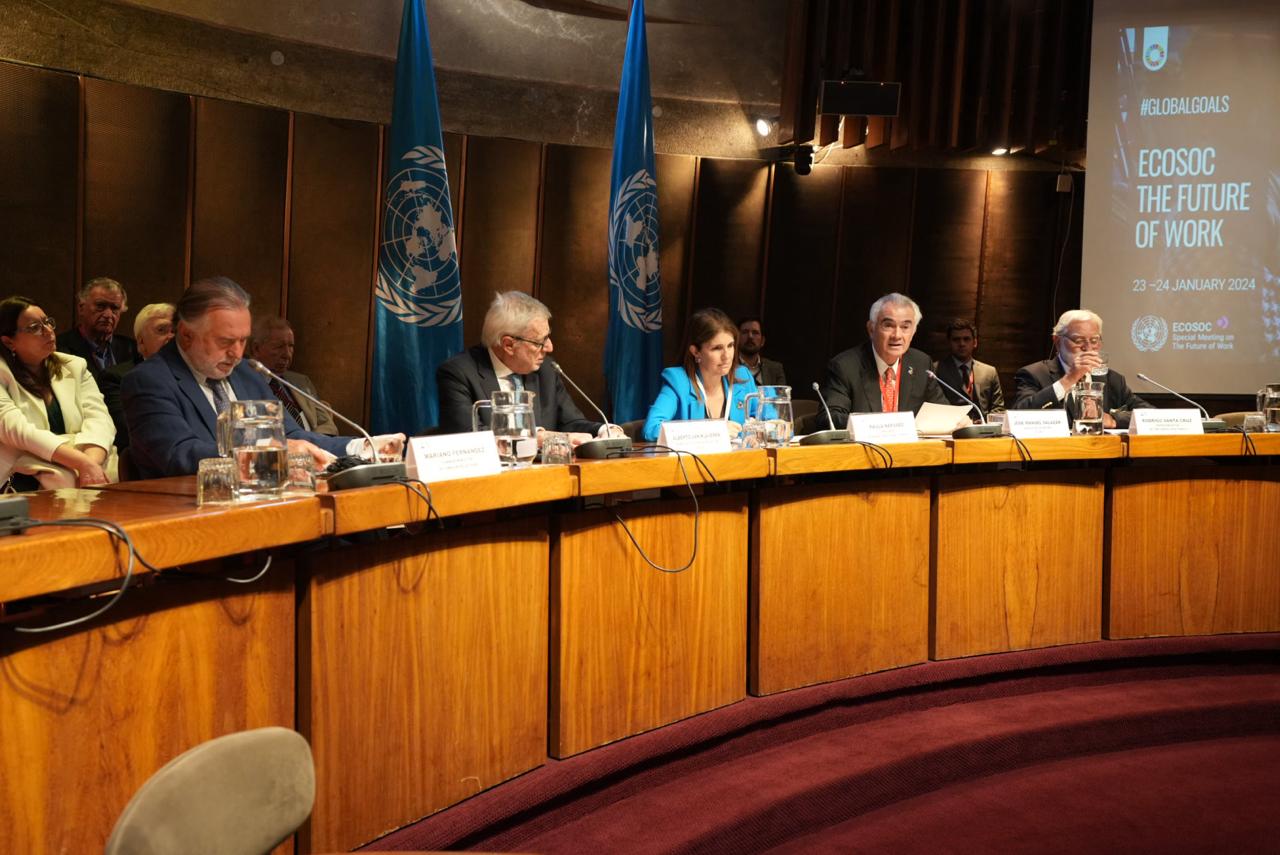Countries Pay Tribute to the Legacy of Hernán Santa Cruz, One of the Most Important Figures in Latin American and Global Diplomacy
At a ceremony held in the framework of a special meeting of ECOSOC, which took place in Chile, ECLAC launched a new edition of the renowned Chilean lawyer’s memoirs entitled “Cooperate or Perish: The Dilemma of the World Community.”

The countries gathered at the Special Meeting of the United Nations Economic and Social Council (ECOSOC) on the “Future of Work” – which concluded today at the main headquarters of the Economic Commission for Latin America and the Caribbean (ECLAC) in Santiago, Chile – paid tribute to the legacy of Chilean lawyer Hernán Santa Cruz, one of the most important figures in Latin American and global diplomacy, a member of the drafting committee of the Universal Declaration of Human Rights, and originator of such momentous initiatives as the creation of ECLAC in February 1948.
At the ceremony, in which the 75th anniversary of the Universal Declaration of Human Rights was commemorated, ECLAC launched a new edition of the three volumes that make up Hernán Santa Cruz’s memoirs Cooperate or Perish: The Dilemma of the World Community, originally published in 1984 and conceived of by its author as “a Latin American vision of the gestation, achievements, obstacles and perspectives of the United Nations system for dignifying human beings and peoples.” This publication constitutes a richly documented chronicle of the genesis of multilateralism at the start of the postwar period and of the progress and setbacks that marked its trajectory between 1945 and 1990.
The event was led by José Manuel Salazar-Xirinachs, ECLAC’s Executive Secretary; Alberto van Klaveren, Minister of Foreign Affairs of Chile; Ambassador Paula Narváez, President of ECOSOC and Permanent Representative of Chile to the United Nations; and Rodrigo Santa Cruz, the son of Hernán Santa Cruz. Also participating were professor Mikel Mancisidor, a member of the United Nations Committee on Economic, Social and Cultural Rights, and Mariano Fernández, a former Chilean Foreign Affairs Minister.
Foreign Minister Alberto van Klaveren highlighted the significant participation that Hernán Santa Cruz had in initiatives such as the drafting of the Universal Declaration of Human Rights, “where he brought the voice of Latin America and, with the strength that characterized him, insisted on the inclusion of economic and social rights.”
He further recalled that with the argument that Latin America had also been affected by the Second World War and that its economy had suffered, in part due to the contribution the region made by offering raw materials to the allied forces, “he was able to convince a somewhat skeptical United Nations of the need to have an institution like ECLAC, which has played such an important role in the generation of Latin American economic thinking.”
Ambassador Paula Narváez, meanwhile, emphasized that memory, legacy and multilateralism are three essential elements of Hernán Santa Cruz.
“Ambassador Santa Cruz presents in his memoirs a strenuous yet impartial defense of multilateralism and particularly on the importance of working together to achieve a world without hunger or poverty, a world in which human dignity would be based on respect for human rights, on the self-determination of peoples and where the elimination of inequality would prevail,” she stated.
In his remarks, ECLAC’s Executive Secretary, José Manuel Salazar-Xirinachs, pointed up the republishing of Hernán Santa Cruz’s memoirs and noted that the ideas, thinking and diagnosis contained in the renowned Chilean diplomat’s testimonial piece of writing remain relevant and current.
“As Hernán Santa Cruz indicates in the presentation of the book that we are republishing today, ‘humanity has not experienced such a critical situation as the current one since the Second World War. It is facing a variety of crises that are spreading to all corners of the Earth.’ Forty years later, the world continues to face the same dilemma of ‘cooperating or perishing,’” ECLAC’s highest authority affirmed.
He added that today – amid a cascade of crises and sharp geoeconomic and geopolitical tensions, in addition to armed conflicts in which several countries and powers have clear stances that they see as matters of national security – hopeful proposals are needed along with dialogue and processes that would avert an escalation of rivalries and channel energies and efforts along paths of peace, prosperity and economic and social well-being.
José Manuel Salazar-Xirinachs urged for making Hernán Santa Cruz’s legacy “our own, and with pride,” facilitating joint action to revitalize multilateralism and promoting the implementation of existing commitments while agreeing upon new solutions to new challenges.
“It is time to let our imagination loose and seek new approaches, foster transformational changes, imagine renewed institutions, be the builders of a more just, productive, inclusive and sustainable future, just as Hernán Santa Cruz did,” he emphasized.
On behalf of the family of Hernán Santa Cruz, his son Rodrigo highlighted the leading role that his father had in the drafting of the Declaration of Human Rights and in the creation of ECLAC.
“For my father, who always had his hopes pinned on a better world for all, and especially for those most lacking, the United Nations is an irreplaceable organization. It would have been a dream for him to imagine that more than 70 years after the approval of the Universal Declaration of Human Rights and the creation of ECLAC we would be remembering him, accompanied by representatives of 54 countries at this special session of ECOSOC,” he stated.
Related content
Reedición de las memorias de Hernán Santa Cruz
Palabras del Secretario Ejecutivo de la CEPAL, José Manuel Salazar-Xirinachs, en el evento paralelo a la reunión del ECOSOC “Reedición de las memorias de Hernán Santa Cruz, ‘Cooperar o perecer: el…